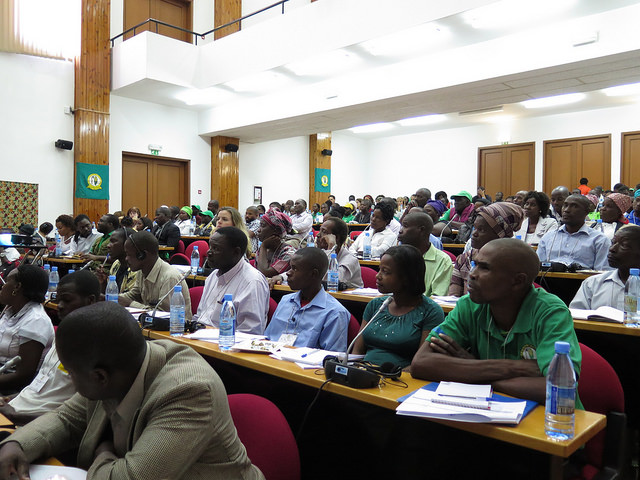 (Mozambique, Maputo, October 1, 2014) –The III International Conference of Farmers and Soil, hosted by the National Farmers Union (UNAC) started today and will run for 2 days. About 250 participants participated in the conference held at the Conference Centre of TDM in Maputo. The conference focuses on the usurpation of the land, implementation of mega-projects with a direct impact on the day-to-day life of the farmers, poor access to credit and the lack of markets for farm produce among other issues.
(Mozambique, Maputo, October 1, 2014) –The III International Conference of Farmers and Soil, hosted by the National Farmers Union (UNAC) started today and will run for 2 days. About 250 participants participated in the conference held at the Conference Centre of TDM in Maputo. The conference focuses on the usurpation of the land, implementation of mega-projects with a direct impact on the day-to-day life of the farmers, poor access to credit and the lack of markets for farm produce among other issues.
“Our production will fall because we are running out of land,” said Costa Estevão, the representative of the northern region. According to him the phenomenon [usurpation of the land] will reduce production, and “push” many farmers to hunger and poverty. Estevão claimed that many farmers are becoming landless. For instance, he said that the company Agro-alpha in Monapo grabbed 10 hectares of land from a citizen who had the documents of ownership, access and use of such land. This situation happens uneventfully and trivially.
On megaprojects, Costa Estevão claimed that they are being implemented without any prior consultation with the communities. Costa believes that large projects can guarantee employment, but “the farmer without land is sad.“
Fertilizer use by large companies affects farmers
The other issue that dominated the opening of the conference had to do with fertilizer use by large companies. Rebeca Mabui from UNAC Maputo, representing the South, said that the banana production in Moamba, for instance, is forcing farmers “to use other areas due to high use of chemicals”. Moreover, according to Mabui farmers “cannot afford to do anything about the situation.” Mabui questioned who actually “enjoys mechanized agriculture?” She also addressed the issue of usurpation of land in the coastal areas in the provinces of Gaza, Maputo and Inhambane.
Difficulties in access to credit and lack of markets
Rita Rizuane, member of the UNAC’s board, complained about the difficulties in accessing credit. She said banks do not give loans to farmers claiming that “Agriculture is a risky business.” She also complained about the lack of markets for agricultural produce. Rita asked the government to provide “agricultural inputs and extension workers”.
The farmers also complained about the air and water pollution in Tete and Manica which has made it difficult to leave food outdoors and the water undrinkable.
The III conference aims to deepen democratic public debate about the major structural challenges of the agricultural sector’s performance including the need for land reform, and means of production, and the phenomenon of land invasion.
